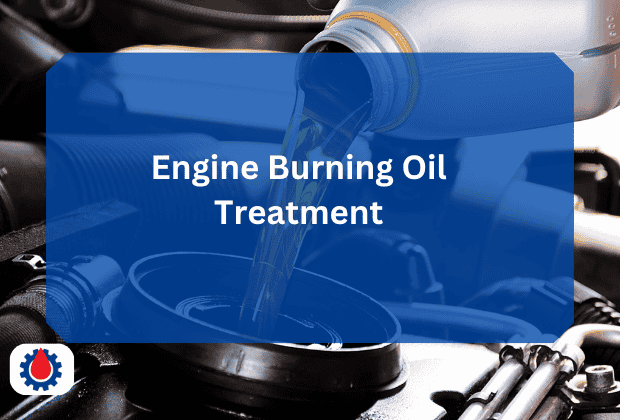Oil burning leads to frequent top-offs, smoky exhaust, reduced fuel efficiency, and, in worst cases, serious engine damage.
In this guide, we’ll look at the five best engine oil burning treatments available on the market. These additives are easy to use and formulated to rejuvenate engine components, reduce oil consumption, and prolong engine life.
Engine Burning Oil Treatment
1. Liqui Moly Oil Smoke Stop
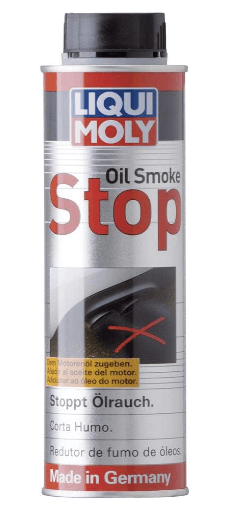
Liqui Moly is a respected German brand known for premium-quality engine additives. Their Oil Smoke Stop is designed to reduce blue exhaust smoke caused by burning oil and stabilize oil consumption in gasoline and diesel engines.
Features:
- Reduces oil burning and exhaust smoke.
- Conditions and seals worn valve guides and piston rings.
- Improves oil viscosity under high temperatures.
- Works with both conventional and synthetic oils.
- Suitable for older and high-mileage engines.
Best for: Drivers looking for a fast-acting, smoke-reducing formula from a trusted manufacturer.
2. BlueDevil Oil Stop Leak
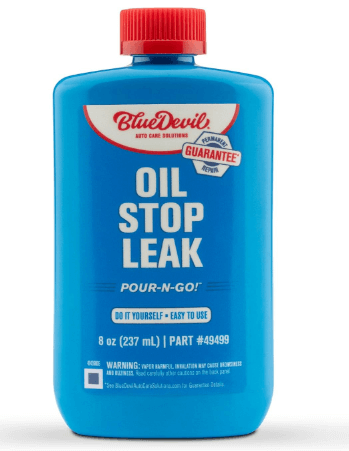
BlueDevil Oil Stop Leak is a powerful additive that repairs and reconditions dried, shrunken, or cracked seals. It is safe for gasoline and diesel engines and is often praised for its long-term effectiveness in reducing oil loss.
Features:
- Seals leaks in the main seal, valve cover gasket, and more.
- No clogging of engine components.
- Compatible with all types of engine oil.
- Designed for older, high-mileage engines.
- Helps rejuvenate gaskets and O-rings.
Best for: Vehicles with visible oil leaks or engines with aging internal seals.
3. Lucas High Mileage Oil Stabilizer
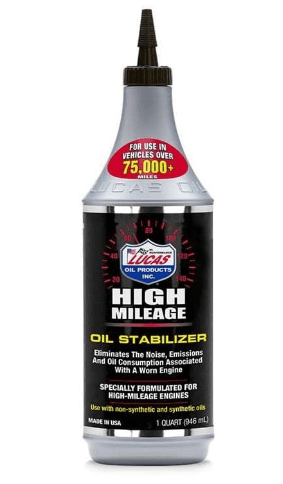
Lucas is one of the most recognized names in automotive additives. Their High Mileage Oil Stabilizer is formulated for engines with over 75,000 miles, helping to reduce oil burning, extend oil life, and improve compression.
Features:
- Reduces oil consumption in older engines.
- Thickens oil to protect against wear and heat.
- Minimizes engine noise and dry starts.
- Compatible with synthetic and conventional oils.
- Can be used in manual transmissions and differentials.
Best for: High-mileage vehicles experiencing oil loss and noisy operation.
4. STP Smoke Treatment
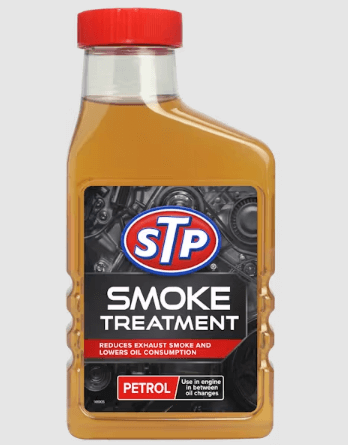
STP’s Smoke Treatment is an economical solution designed to reduce exhaust smoke and oil burning. It’s ideal for older vehicles and is formulated with a high-viscosity base to reduce oil blow-by.
Features:
- Thickens oil to reduce burning in older engines.
- Helps reduce blue smoke emissions.
- Protects against wear and friction.
- Safe for all gasoline engines.
- Easy to use during oil changes or top-ups.
Best for: Budget-conscious drivers looking to manage moderate oil burning and smoke.
5. Bar’s Leaks Engine Repair
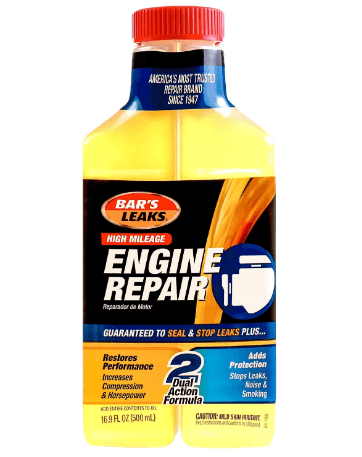
Bar’s Leaks Engine Repair is a dual-action formula that not only seals minor leaks but also improves engine compression and reduces oil consumption. It’s an all-in-one solution for engines with multiple wear symptoms.
Features:
- Rebuilds compression by restoring cylinder pressure.
- Stops oil burning and reduces noise.
- Treats timing chain and valve train noise.
- Seals minor engine oil leaks.
- Works with all gasoline and diesel engines.
Best for: Engines needing both leak repair and internal component restoration.
Related 7 Reasons Your Engine Burning Oil(With Solutions)
Why Engines Burn Oil
Oil burning typically happens when oil enters the combustion chamber and is burned along with the air-fuel mixture. Common causes include:
- Worn or stuck piston rings
- Valve seal deterioration
- PCV valve malfunction
- Cylinder wall damage
- Overheating and sludge buildup
This problem becomes more frequent in high-mileage engines or those poorly maintained over time.
Related Engine Oil Leak – 7 Alarming Signs(How to Fix Them)
How Oil Burning Treatments Work
Engine oil burning treatments are specially formulated to:
- Condition and swell worn seals and gaskets.
- Increase oil viscosity to reduce blow-by.
- Reduce friction between engine parts.
- Minimize oil leaks that contribute to oil loss.
- Clean internal engine components.
They’re not permanent fixes but can offer substantial short-to-mid-term relief, especially when paired with routine maintenance.
Related Zinc Additive Engine Oil(Benefits & Hidden Formula)
When to Use an Oil Burning Treatment
You should consider using an oil-burning additive if:
- You’re adding oil between oil changes.
- You notice blue smoke from the exhaust.
- Your engine is ticking or knocking due to low oil.
- There are signs of oil leaks, but no drips under the vehicle.
- Your vehicle is high-mileage and losing performance.
Related Low Ash Engine Oil(Explained + Top 3 Best Picks)
FAQs
What can I put in my engine to stop it burning oil?
You can use engine oil additives or treatments designed to stop oil burning. Products like Liqui Moly Oil Smoke Stop, BlueDevil Oil Stop Leak, and Lucas High Mileage Oil Stabilizer are effective in conditioning seals, restoring compression, and reducing oil consumption.
These additives are poured directly into the oil fill port and work over time to reduce blow-by and oil loss.
Related SBC Engine Oil Cooler Kit(Top 5 Best 2025)
What to do if your car is burning engine oil?
If your car is burning oil, start by checking your oil level frequently and topping off as needed. Use a high-mileage oil or an oil treatment to reduce consumption. Next, inspect for visible leaks or signs of blue smoke from the exhaust.
If the problem persists, have a mechanic check for worn piston rings, valve seals, or a clogged PCV valve. In severe cases, engine repair or rebuild may be required.
Can I still drive my car if it smells like burning oil?
Yes, but it’s not recommended to continue driving for long periods without addressing the issue. A burning oil smell often indicates oil is leaking onto hot engine components, which can lead to smoke, engine damage, or even fire in extreme cases. Check for leaks and low oil levels, and consider using a treatment or visiting a repair shop for diagnosis.
Why does my engine burn through oil so quickly?
Rapid oil consumption can be caused by several issues, including worn piston rings, degraded valve seals, a faulty PCV valve, or thin engine oil. High engine temperatures, poor maintenance, or sludge buildup can also contribute. Using the wrong viscosity of oil can make matters worse. In older engines, the internal seals may shrink, allowing oil into the combustion chamber.
How do I turn off burning oil?
You can’t “turn off” burning oil like flipping a switch, but you can reduce or stop it by treating the root cause. Use oil treatments to rejuvenate seals and thicken oil, replace faulty components like the PCV valve, switch to high-mileage or thicker oil, and keep up with regular maintenance. If the damage is severe, mechanical repairs may be necessary.
Final Thoughts
Burning oil doesn’t always mean your engine is on its last leg. With the right oil treatment, you can reduce oil consumption, limit smoke emissions, and restore some lost performance, especially in older vehicles.
The five products listed above offer a range of benefits for engines in different conditions, from high-mileage stabilizers to leak sealants and viscosity boosters.
Using these additives as part of a larger maintenance plan, like regular oil changes, using high-quality oil, and replacing faulty parts, can significantly extend the life of your engine and save on costly repairs down the road.

